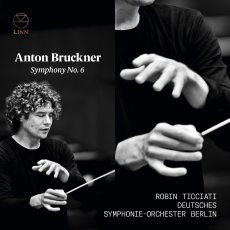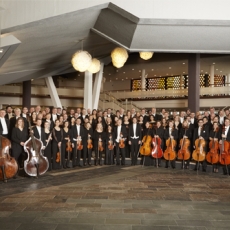Robin Ticciati & DSO - Bruckner: Symphony No. 6 - MusicWeb International (MC)
This album is Robin Ticciati’s first release of a Bruckner symphony, although in 2013 he did record Bruckner’s Mass No. 3 with the Bamberger Symphoniker on the Tudor label. Now as chief conductor and music director of the Deutsches Symphonie-Orchester Berlin (DSO Berlin), Ticciati has recorded Bruckner’s Sixth Symphony.
Of Bruckner’s mature symphonies, along with the Fifth, it is the Sixth Symphony that I encounter least in the concert hall. Bruckner described the Sixth as the “boldest” of his symphonies and, to use a Beethoven parallel, the work was sometimes known as Bruckner’s “Pastoral.” When it was commenced in 1879, only three of Bruckner’s symphonies had been performed. Completed in 1881, the Sixth was not subject to revision by Bruckner, yet Mahler, who gave the première of the finished symphony in 1899, made substantial alterations, a task which didn’t need to be sanctioned as Bruckner had died three years previously. The first performance of the unabridged version was not given until 1901 at Stuttgart under Karl Pohlig. A check on abruckner.com shows that most recordings of the Sixth use Bruckner’s original 1881 version edited by Leopold Nowak published in 1952. This is the version that Ticciati has chosen to conduct here, which is also favoured by a number of renowned conductors including Jochum, Kubelik, Wand, Solti, Blomstedt, Inbal, Barenboim, Chailly and Thielemann.
The Sixth seems to have a more secular quality, rather than Bruckner’s characteristic religious spirituality, with its sound-world comparable to walking round a cathedral. Conspicuous throughout is the balance Ticciati perceptively achieves from his players between overall weight and pellucid detail. In the opening movement Majestoso, it feels as if an Alpine summit is emerging mysteriously, gradually becoming visible through bright early morning haze. The pulse Ticciati adopts maintains impressive momentum from a swirling character of restlessness to retreating passively. Eugen Jochum has written that the “point of culmination” is contained in the opening movement and Ticciati achieves his orchestral climaxes incisively with significant impact. Permeating the movement is an overall sense of nobility with an undertow of reflection, which Ticciati and his players catch splendidly. The Adagio, marked Sehr feierlich (Very solemnly), is an emotional experience as Ticciati sustains tenderness and radiant warmth, with contrasting sections containing a distinct sense of sorrow and resignation. The shimmering Berlin strings sound especially striking in the movement. Wild and squally music introduces the relatively short Scherzo, marked Nicht schnell (Not fast) - Trio: Langsam (Slowly), containing writing described by music writer Wolfgang Teubner as having a character “reminiscent of an elfin dance in ghostly dreams”. Ticciati and his players provide an uplifting and optimistic atmosphere of buoyancy and energy, and a prominent feeling of light and shade. Noteworthy here, is the wind playing, especially the evocative hunting horns. In the Finale, Bewegt, doch nicht zu schnell (Lively, but not too fast), Ticciati certainly masters the crucial and complex rhythmic requirements of Bruckner’s writing. Noticeably, the wide dynamics are skilfully negotiated by Ticciati and the score culminates with a satisfyingly majestic blaze of sound.
Recorded at the Philharmonie, Berlin, the sound quality is engineered to a high standard, being extremely clear, with presence and excellent balance. Ideally, a richer sound quality is more to my taste than the rather bright quality provided. The informative booklet essay by Benedikt von Bernstorff adds to the excellence of the Linn release.
There is a wide choice of the Sixth available in the record catalogue, including a number of outstanding accounts. My favourite recordings for their sense of engagement and elevated quality of performance, are from the renowned conductor Günter Wand, who uses the 1881 version (ed. Nowak 1952). Wand conducted several live radio broadcast recordings of the Sixth and his 1999 performance from the Münchner Philharmoniker at Philharmonie, Munich and the Deutsches Symphonie-Orchester Berlin in 1995 at Philharmonie Berlin, both on the Profil label, are mightily impressive. Of those recordings using the Robert Hass (1935) edition, I strongly admire a pair of live accounts from Bernard Haitink conducting the Staatskapelle Dresden in 2003 at the Semperoper, Dresden on Profil and the Symphonieorchester des Bayerischen Rundfunks from 2017 at the Philharmonie, Munich, on BR-Klassik. On Linn this account from Ticciati and the DSO Berlin is compelling, too, and stands comparison with the finest recordings in the catalogue. It’s certainly a recording I will return to again and again.


